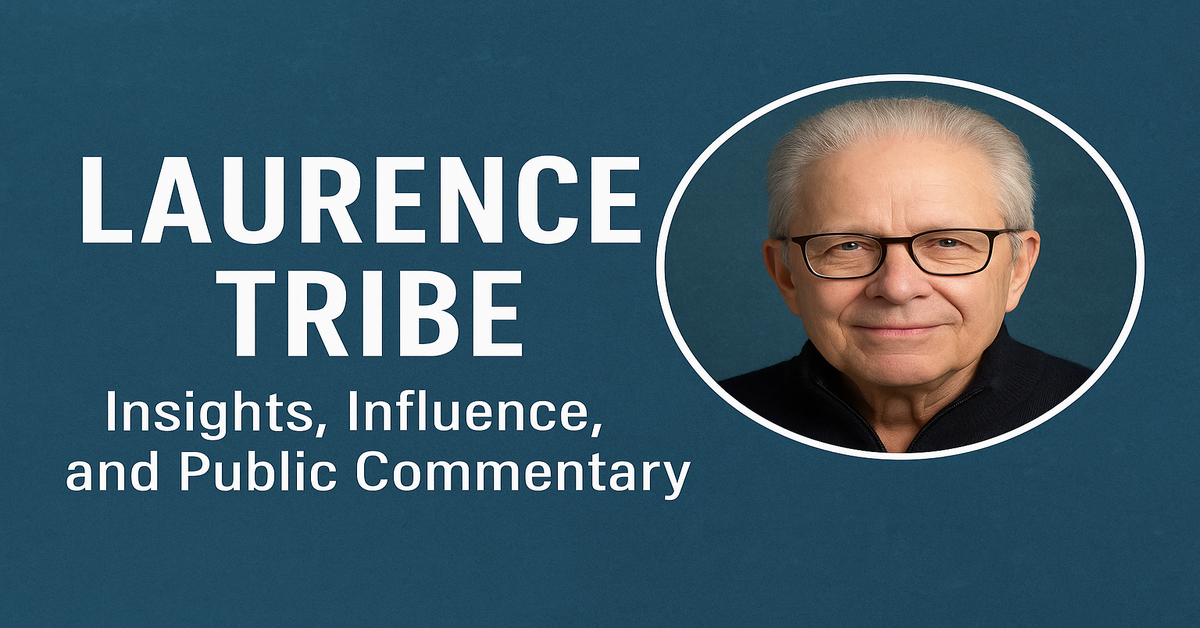
In the contemporary digital age, social media platforms have become crucial arenas for public discourse, academic commentary, and political debate. Among notable figures leveraging these platforms, Laurence Tribe stands out as a distinguished voice. Laurence Tribe is a renowned constitutional law scholar, former professor at Harvard Law School, and legal advisor who has played a significant role in shaping debates surrounding constitutional interpretation, civil rights, and Supreme Court jurisprudence. His presence on Twitter offers a unique window into the intersection of legal scholarship, political analysis, and civic engagement. This article explores Laurence Tribe Twitter presence, examining his contributions, style of communication, influence on public discourse, and the broader significance of his commentary in contemporary legal and political contexts.
Who Is Laurence Tribe?
Laurence Tribe is widely recognized as one of the foremost constitutional law experts in the United States. With decades of academic, professional, and advisory experience, he has written seminal texts on constitutional law, argued cases before the Supreme Court, and advised political leaders and civil rights organizations on legal matters. His scholarship often emphasizes civil liberties, the balance of powers, and the protection of individual rights within the framework of the U.S. Constitution. Over the years, Tribe has become a trusted public intellectual whose opinions resonate beyond academia, influencing policy discussions, legal interpretations, and public understanding of constitutional principles.
Tribe’s entry into social media, particularly Twitter, represents an extension of his commitment to civic engagement and public education. Through concise, accessible posts, he brings complex legal concepts to broader audiences, bridging the gap between scholarly discourse and everyday public interest.
Laurence Tribe on Twitter: Themes and Focus Areas
Laurence Tribe’s Twitter account serves as a platform for commentary on numerous topics. While his primary domain is legal analysis, his tweets often intersect with broader issues, including politics, civil rights, Supreme Court decisions, and contemporary social debates. His contributions can be broadly categorized into the following thematic areas:
1. Constitutional Law and Supreme Court Analysis
One of Tribe’s central focuses on Twitter is the analysis of Supreme Court decisions and constitutional interpretation. He provides detailed insights into landmark cases, procedural developments, and the implications of judicial rulings on civil liberties. His tweets often highlight the practical impact of court decisions on ordinary citizens, making complex legal reasoning accessible to a wider audience.
| Theme | Description | Example Focus |
|---|---|---|
| Judicial Decisions | Analysis of recent Supreme Court rulings | Cases related to free speech, privacy, voting rights |
| Constitutional Principles | Discussion of separation of powers, federalism | Checks and balances, executive authority |
| Legal Precedents | Historical perspective on legal interpretation | Comparison of current cases to landmark rulings |
By framing his commentary in historical and legal context, Tribe educates his audience not only about the “what” of legal outcomes but also the “why,” demonstrating the enduring significance of constitutional principles.
2. Political and Social Commentary
While primarily a legal scholar, Tribe does not confine his Twitter activity to purely technical matters. He frequently comments on contemporary political issues, particularly those that intersect with legal concerns, such as voting rights, executive power, and civil liberties. These tweets often analyze policy proposals, legislative developments, or political actions through the lens of constitutional law, providing followers with informed, evidence-based perspectives.
3. Advocacy for Civil Rights and Liberties
Tribe uses his platform to emphasize the protection of civil rights and liberties. His tweets often address threats to individual freedoms, whether in the context of government overreach, discriminatory practices, or judicial interpretations that may weaken rights protections. By combining legal reasoning with moral and civic considerations, Tribe’s commentary underscores the importance of an informed and active citizenry.
4. Educational Engagement
Beyond critique and analysis, Tribe also uses Twitter as an educational tool. He posts explanations of legal concepts, summaries of complex cases, and clarifications of public misconceptions about the law. This function aligns with his broader mission as an educator, translating intricate legal debates into formats that are accessible to non-specialists.
Communication Style and Approach
Laurence Tribe’s approach on Twitter balances scholarly rigor with accessibility. Unlike purely academic writing, Twitter requires brevity and clarity, a constraint Tribe navigates by distilling complex legal arguments into concise statements without sacrificing substance. Several aspects of his communication style are notable:
- Precision and Accuracy: Tribe’s tweets are carefully worded, reflecting the precision expected of legal scholarship. Each post is grounded in factual analysis and often references legal texts, precedents, or authoritative sources.
- Clarity for a General Audience: Despite the legal complexity, Tribe communicates in a manner that non-specialists can understand. He avoids excessive jargon while retaining necessary technical terms.
- Engagement and Interaction: Tribe occasionally engages with other legal experts, journalists, and followers, responding to questions or clarifying misconceptions. This interaction transforms his account into a dynamic space for public dialogue.
- Contextual Framing: Many tweets contextualize current events within historical or legal frameworks, helping followers understand not just what happened but why it matters.
Impact and Influence
Laurence Tribe’s Twitter presence has significant influence in several domains:
Legal Community
Legal professionals, students, and scholars frequently reference Tribe’s tweets for insights into constitutional interpretation and Supreme Court developments. His commentary helps shape scholarly discussions and informs classroom teaching and legal practice.
Public Discourse
Through accessible explanations and timely commentary, Tribe reaches a broader audience, including journalists, policymakers, and civic-minded individuals. His insights contribute to public understanding of the law, helping citizens engage more meaningfully in debates about governance, rights, and policy.
Political Awareness
Tribe’s analysis often intersects with political events, such as legislative changes, executive actions, or elections. By highlighting legal implications, he encourages followers to consider the constitutional and civic dimensions of political decisions.
| Domain | Influence Type | Example Impact |
|---|---|---|
| Legal | Scholarly reference | Law schools citing Tribe’s analysis in coursework |
| Public | Civic education | Articles referencing his tweets in media discussions |
| Political | Policy awareness | Highlighting constitutional concerns in proposed legislation |
Benefits of Following Laurence Tribe on Twitter
For students, professionals, and engaged citizens, following Laurence Tribe offers several advantages:
- Up-to-Date Legal Insights: Followers gain timely updates on Supreme Court decisions, legislative developments, and emerging legal issues.
- Educational Value: Tweets break down complex topics, providing a learning opportunity for those unfamiliar with legal terminology.
- Critical Thinking: By analyzing legal and political events critically, Tribe encourages followers to think analytically about law, policy, and society.
- Civil Rights Awareness: His commentary emphasizes the protection and expansion of civil liberties, encouraging informed activism.
- Professional Inspiration: Aspiring lawyers and students can observe a model of public intellectual engagement and scholarly communication.
Challenges and Criticisms
While Tribe’s Twitter presence is widely respected, it is not without challenges:
- Conciseness Constraints: Twitter’s character limit can restrict the depth of analysis compared to academic writing.
- Polarized Reception: Given the political nature of some tweets, his commentary occasionally attracts criticism or controversy from opposing viewpoints.
- Misinterpretation Risk: Complex legal ideas simplified for Twitter may be misunderstood without proper context, highlighting the importance of careful reading and follow-up research.
Despite these challenges, Tribe’s overall contribution to public discourse and legal understanding is significant.
Best Practices for Engaging with Laurence Tribe’s Content
To maximize value from following Laurence Tribe on Twitter, consider these strategies:
- Cross-Reference Sources: For deeper understanding, review Supreme Court opinions, academic articles, or legal texts referenced in his tweets.
- Ask Questions: Engage thoughtfully in discussion threads to clarify complex points.
- Contextual Analysis: Consider the historical and constitutional context behind his commentary.
- Share Knowledge: Use insights from his posts to educate others or contribute to informed debates.
- Follow Related Experts: Complement Tribe’s analysis with perspectives from other constitutional scholars to develop a well-rounded view.
Conclusion
Laurence Tribe’s Twitter account serves as an invaluable bridge between high-level constitutional scholarship and public discourse. Through concise, precise, and insightful commentary, he informs, educates, and challenges followers to engage critically with issues of law, politics, and civil liberties. His account exemplifies the potential of social media to democratize access to expert knowledge while maintaining rigorous analytical standards. For anyone interested in constitutional law, current Supreme Court developments, or civic engagement, following Laurence Tribe on Twitter provides both intellectual enrichment and practical awareness of the legal framework shaping modern society. By combining scholarly expertise with digital accessibility, Tribe demonstrates how public intellectuals can influence informed debate and empower citizens in the digital era.
Click Here For More Blog Posts!
Frequently Asked Questions (FAQs)
1. Who is Laurence Tribe?
Laurence Tribe is a Harvard Law School professor and renowned constitutional law scholar known for his legal expertise and public commentary.
2. What topics does Laurence Tribe cover on Twitter?
Tribe discusses constitutional law, Supreme Court decisions, civil rights, political events, and legal education.
3. Can non-lawyers understand his tweets?
Yes, Tribe writes in an accessible style, making complex legal concepts understandable to the general public.
4. Is Laurence Tribe active in political commentary?
While his primary focus is legal, he often comments on political events that intersect with constitutional and civil rights issues.
5. How can I best follow and learn from his Twitter content?
Engage with his tweets thoughtfully, cross-reference legal sources, and consider historical and constitutional context for full understanding.




